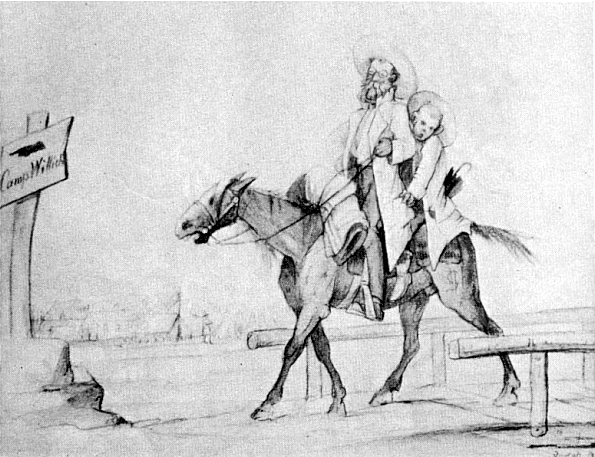Willich appointed the very able Indianapolis native Edward Mueller to the post of regiment Quartermaster on August 21, a choice that proved invaluable to the men at times when other regiments would suffer. The 32nd shared Camp Murphy with other Indiana organizations attempting to form as regiments. The men soon referred to their little portion of the post as Camp Willich, a name adopted on all correspondence during the period.
Hundreds of ethnic German volunteers from the region, drawn by Willich's reputation, traveled to Indianapolis to join the regiment. Most were immigrants who had settled in the state; many with military backgrounds developed on the fields of Europe. Entire companies arrived from the cities of Evansville, Terre Haute, LaFayette and Madison. Also answering the call were a number of citizens from the German enclaves in or around the Ohio River towns of Jeffersonville, New Albany, and Clarksville. Kentuckians traveled from the Germantown District of Louisville and Ohio Germans, turned away in Cincinnati at the organization of the 9th Ohio, rushed to the Indiana call for recruits. A group of approximately thirty Germans from Tennessee, escaping the Confederate draft, made the trek north to enlist in the 1st German, 32nd Regiment Indiana Volunteer Infantry.
Companies held elections to select their own officers beginning September 18, 1861. Most of the companies formed around a core of Turnverein or militia organizations from the major communities of Indiana that arrived intact at Indianapolis to join the regiment. This was so much the case that the men referred to themselves as the 'Aurora Company', or the 'Lawrenceburg Company' and even the 'Cincinnati Company', made up of a large number of Ohio Germans. Soldiers nominated friends or relatives they had known all their lives to lead them to war. Election of staff officers took place once the company elections ended. [7]
From his farm near Danville in Illinois, Henry von Trebra, another former officer of the Prussian military, heard the news of the formation of the all-German regiment in Indiana. He and his younger brother, Louis, traveled to Indianapolis to offer their services. Willich immediately assigned the elder von Trebra the responsibility of regiment drillmaster and the regiment elected him lieutenant colonel on September 23. The 32nd's rapid progress in infantry drill and tactical maneuvering proficiency demonstrated von Trebra's expertise. Those skills would prove invaluable on future fields of conflict. [8]
The variety of weapons provided by the state presented unique difficulties to von Trebra's training program. At first the guns available were a mixture; mostly Enfields with a few new Springfields and too many of a weapon that Willich referred to as 'Greenwoods'. This altered Austrian flintlock musket derived its name from the Cincinnati-based Greenwood, Miles & Company that modified the muskets for percussion and bored the barrels to .58 caliber. The weapon was of very poor quality and Willich took steps to eventually acquire the newer Springfields for all the companies of the regiment. An upsurge of rebellion force in the region made the need for arms imperative.

2nd Lieutenant Adolph G. Metzner of Company 'A', appointed by Willich as the regiment cartographer, produced this caricature of Henry and Louis von Trebra arriving August 1861 at Camp Willich in Indianapolis. Collection of E. Burns Apfeld.
Events escalated quickly in the late summer of 1861 nullifying Kentucky's claim to neutrality. On September 3, Confederate forces, under the command of Major General Leonidas Polk, occupied and began fortifying the Mississippi River town of Columbus in western Kentucky effecting a barrier to river navigation. Two days later, Union Brigadier General Ulysses S. Grant moved his army into Paducah and Smithland in Kentucky at the mouths of the Tennessee and Cumberland Rivers to secure those invasion routes.